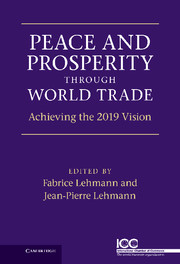Book contents
- Frontmatter
- Contents
- Notes on contributors
- Foreword
- Preface: the ICC vision
- Historical overview and dynamics
- Editorial note
- A Global systemic transformations
- B Governance of global trade
- C Poverty and global inequities
- D The long view on interlocking crises
- E Global business responsibilities
- Editorial introduction
- E1 Responsible leadership
- E2 For great leadership
- E3 A lesson on trade, regulation and competition policy?
- E4 International trade and business ethics
- E5 Who's driving twenty-first century innovation? Who should?
- E6 Responsible sourcing
- E7 Trade, international capital flows and risk management
- E8 Trade, corporate strategies and development
- E9 How can trade lead to inclusive growth?
- E10 Trade and human rights: friends or foes?
- E11 Trade: the spirit and rule of law
- Conclusion: the imperative of inclusive global growth
- Index
E10 - Trade and human rights: friends or foes?
Published online by Cambridge University Press: 05 July 2011
- Frontmatter
- Contents
- Notes on contributors
- Foreword
- Preface: the ICC vision
- Historical overview and dynamics
- Editorial note
- A Global systemic transformations
- B Governance of global trade
- C Poverty and global inequities
- D The long view on interlocking crises
- E Global business responsibilities
- Editorial introduction
- E1 Responsible leadership
- E2 For great leadership
- E3 A lesson on trade, regulation and competition policy?
- E4 International trade and business ethics
- E5 Who's driving twenty-first century innovation? Who should?
- E6 Responsible sourcing
- E7 Trade, international capital flows and risk management
- E8 Trade, corporate strategies and development
- E9 How can trade lead to inclusive growth?
- E10 Trade and human rights: friends or foes?
- E11 Trade: the spirit and rule of law
- Conclusion: the imperative of inclusive global growth
- Index
Summary
Nearly all the member countries of the WTO have signed the 1948 Universal Declaration on Human Rights. To the extent that trade boosts or hinders these rights, WTO members have a collective responsibility to ensure that world trade rules are consistent with human rights obligations. Yet the phrase ‘human rights’ continues to raise eyebrows at the WTO, as if the fulfilment of political, economic, social and cultural rights were foreign to, or inherently contradictory with, the pursuit of increased world trade flows and a rules-based trading system.
The reticence of many governments to take into account human rights in trade negotiations is probably linked with the long-standing use of unilateral trade sanctions to pursue a variety of public policy goals including international security or the respect for human rights. Indeed, trade sanctions have been used for centuries: in 432 bc Pericles enacted a decree banning trade with Megara in order to protest against the kidnapping of Aspasian women. Since World War I, there have been more than 170 cases of economic sanctions including trade, investment, or travel restrictions. Most of them have been applied unilaterally. Most recently, a number of developed countries have decided to withdraw trade preferences or offer increased market access based on the respect of human rights by exporting countries. Even with the best of intentions, these initiatives have convinced many developing country governments that rich country governments want to use human rights as a tool to threaten their sovereignty or to shut them out of their markets.
- Type
- Chapter
- Information
- Peace and Prosperity through World TradeAchieving the 2019 Vision, pp. 279 - 283Publisher: Cambridge University PressPrint publication year: 2010

